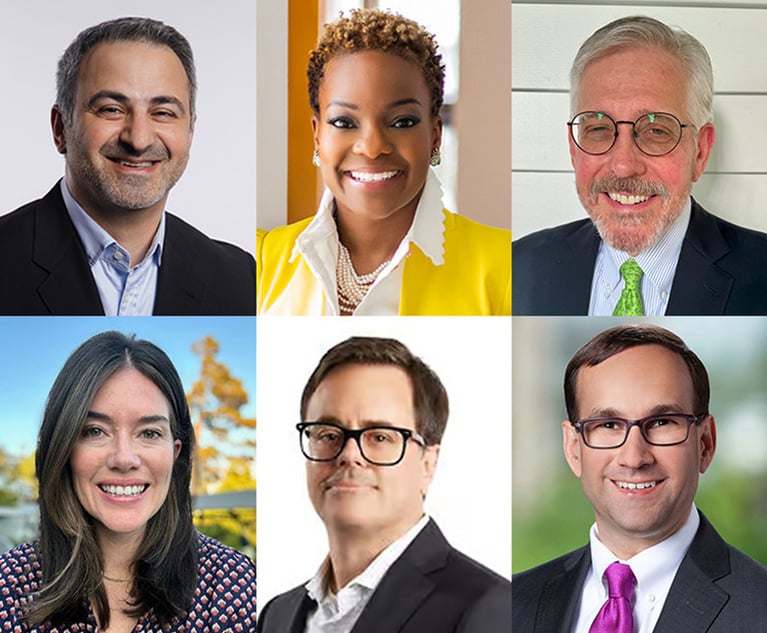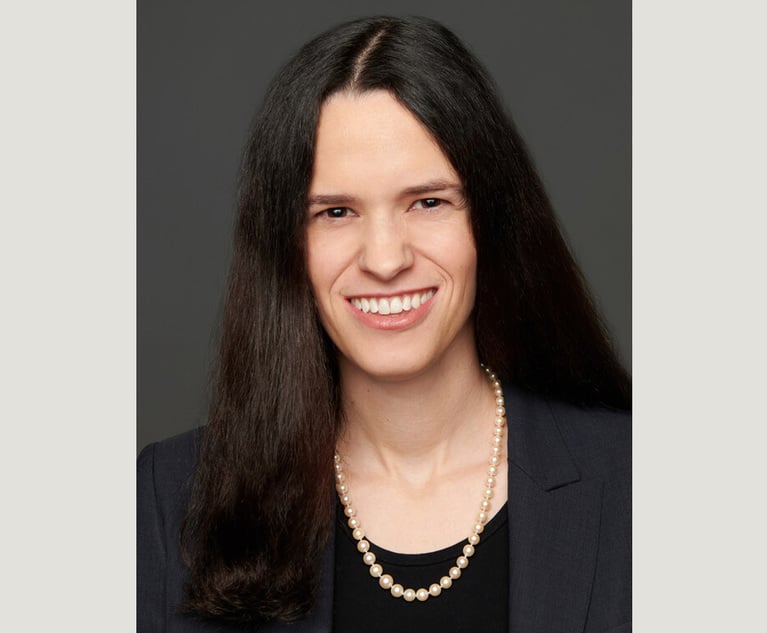Circuit split reignites debate over reverse payments
Experts say a Supreme Court ruling would be hard to predict
September 23, 2012 at 08:00 PM
13 minute read
Thanks to the unusual settlement, both sides in the patent infringement suit won big.
The patentee, Schering-Plough Corp., won by protecting its exclusive right to make and sell K-Dur, one of the company's most popular and profitable patented drugs. Schering got one of its rivals to postpone marketing its (allegedly infringing) generic version of K-Dur.
The alleged infringer, Upsher-Smith Laboratories, won because instead of paying hefty amounts to the patentee—as is ordinarily done in settlements—it received $60 million from the patentee. That was significantly more than Upsher-Smith would have earned from its generic drug.
This reverse-payment settlement was a good deal for both drug companies. But plenty of other stakeholders may have suffered. By keeping generic versions of K-Dur off the market, the settlement kept prices high for employers, health insurers, drugstores and consumers, according to the Federal Trade Commission (FTC). They were paying far more for the drug, perhaps tens of millions of dollars more per year.
The FTC insists such reverse-payment settlements violate antitrust laws. The courts, however, have held otherwise. Since 2003, the 2nd, 11th and Federal Circuits repeatedly have held that the right of a patentee to settle its infringement suits insulates such settlements from practically all antitrust scrutiny. As a result, reverse-payment settlements have become common in the drug industry.
That may be about to change after the 3rd Circuit's July decision in In re K-Dur Antitrust Litigation. The court held that Schering's reverse-payment settlement was “prima facie evidence of an unreasonable restraint of trade.”
The ruling created a clear circuit split and reignited the debate over the legality of reverse payments. Supporters of K-Dur say it will bring generic drugs to market faster, saving consumers (and health insurers) billions of dollars annually. Critics of K-Dur say it will prevent settlements and drag out patent litigation, thus delaying generic competition and driving up costs for everyone in the drug industry.
Both sides, however, agree on one thing. “This is a very important decision,” says David Sorensen, a shareholder at Berger & Montague. Sorensen represented some of the plaintiffs in K-Dur.
Open Door
Drug companies have not always used reverse payments. They began doing so in the late 1990s, but stopped after the FTC filed some antitrust enforcement actions in 2000.
Then, in late 2003, the 11th Circuit issued its decision in Valley Drug Co. v. Geneva Pharms., Inc. The panel held that a patent gave its owner the right to exclude competition, and antitrust law did not undermine this right. A patentee thus could settle its patent infringement suit on almost any terms it liked (provided the patent was not obtained by fraud and the infringement suit was not a sham). A settlement could run afoul of antitrust law only if it went beyond the defendant's allegedly infringing products and restricted the manufacture and sale of products outside the scope of the patent. Subsequent decisions by the 11th, 2nd and Federal Circuits all adopted this “scope of the patent” standard. And drug companies once again made reverse payments.
Many experts have excoriated the scope-of-the-patent test because it allows patentees to buy off competition without subjecting the relevant patents to any scrutiny. “It assumes the validity of the patent, and that's what is often at issue,” says Prof. Michael Carrier of Rutgers School of Law. “If the patent is invalid, it has no scope at all, so the reverse payment cannot be within the scope of the patent.”
The 3rd Circuit agreed. It stated in K-Dur that the scope-of-the-patent test provides an “almost unrebuttable presumption of patent validity” and “improperly restricts the application of antitrust law.”
Circuit Critique
The 3rd Circuit explicitly rejected the scope-of-the-patent test in favor of a “quick look rule of reason analysis.” Under this analysis, any reverse-payment settlement in which a defendant postpones competition is prima facie evidence of an unreasonable restraint of trade. To rebut this evidence, the parties in the settlement must prove either that the reverse payment was for a purpose other than delayed entry or the payment somehow promoted competition.
The D.C. Circuit applied the same legal standard in a 2001 decision, Andrx Pharms., Inc. v. Biovail Corp. Int'l. And the 6th Circuit used an even tougher standard in its 2003 decision In re Cardizem CD Antitrust Litigation. The 6th Circuit held that reverse-payment settlements are per se illegal restraints of trade.
However, in both Andrx and Cardizem, the reverse-payment settlements were unusually broad. The patentees were trying to limit competition not just against their patented drugs, but against other products, too. These settlements went beyond the scope of the patents. The 3rd Circuit's ruling in K-Dur is thus the first time that “the scope-of the-patent test was critiqued by an appellate court,” Carrier says.
The case establishes a clear circuit split. Some experts say there is a 3-3 split, whereas others say it is a 3-1 split. Either way, it invites Supreme Court review.
Schering's counsel, who declined to comment for this article, have filed a cert petition, which some experts say has a good chance of being granted.
Uncertain Future
If the high court accepts the case, it is unclear how it might rule. K-Dur concerns “two strong principles that are not completely reconcilable,” Carrier says. “Do you favor settlements or challenges to weak patents?”
Should K-Dur's standard be upheld, governments, health insurers and everyone else who pays for drugs could benefit. “This will bring generic drugs more rapidly into the marketplace,” says Carole Handler, a partner at Lathrop &
Gage. As a result, consumers will save $3.5 billion per year, according to a 2010 FTC study.
Not everyone agrees, however, that stopping reverse payments will result in generic drugs coming onto the market sooner. Some experts assert that without reverse payments, drug companies will be far less likely to settle their patent infringement suits. “Parties will litigate these cases to the bitter end,” says John Griem Jr., a partner at Loeb & Loeb. These lengthy patent suits will delay generic products coming onto the market, he asserts.
This increased litigation also will harm drug companies' bottom lines. “It will increase the cost and complexity of pharmaceutical patent litigation, which already is on the high end of litigation costs,” Griem says.
More infringement trials would be good, some experts counter. “Weak patents can be subjected to litigation and overcome,” Handler says. “Society is not benefiting from a private deal that has the effect of limiting competition.”
Thanks to the unusual settlement, both sides in the patent infringement suit won big.
The patentee,
The alleged infringer, Upsher-Smith Laboratories, won because instead of paying hefty amounts to the patentee—as is ordinarily done in settlements—it received $60 million from the patentee. That was significantly more than Upsher-Smith would have earned from its generic drug.
This reverse-payment settlement was a good deal for both drug companies. But plenty of other stakeholders may have suffered. By keeping generic versions of K-Dur off the market, the settlement kept prices high for employers, health insurers, drugstores and consumers, according to the Federal Trade Commission (FTC). They were paying far more for the drug, perhaps tens of millions of dollars more per year.
The FTC insists such reverse-payment settlements violate antitrust laws. The courts, however, have held otherwise. Since 2003, the 2nd, 11th and Federal Circuits repeatedly have held that the right of a patentee to settle its infringement suits insulates such settlements from practically all antitrust scrutiny. As a result, reverse-payment settlements have become common in the drug industry.
That may be about to change after the 3rd Circuit's July decision in In re K-Dur Antitrust Litigation. The court held that Schering's reverse-payment settlement was “prima facie evidence of an unreasonable restraint of trade.”
The ruling created a clear circuit split and reignited the debate over the legality of reverse payments. Supporters of K-Dur say it will bring generic drugs to market faster, saving consumers (and health insurers) billions of dollars annually. Critics of K-Dur say it will prevent settlements and drag out patent litigation, thus delaying generic competition and driving up costs for everyone in the drug industry.
Both sides, however, agree on one thing. “This is a very important decision,” says David Sorensen, a shareholder at
Open Door
Drug companies have not always used reverse payments. They began doing so in the late 1990s, but stopped after the FTC filed some antitrust enforcement actions in 2000.
Then, in late 2003, the 11th Circuit issued its decision in Valley Drug Co. v. Geneva Pharms., Inc. The panel held that a patent gave its owner the right to exclude competition, and antitrust law did not undermine this right. A patentee thus could settle its patent infringement suit on almost any terms it liked (provided the patent was not obtained by fraud and the infringement suit was not a sham). A settlement could run afoul of antitrust law only if it went beyond the defendant's allegedly infringing products and restricted the manufacture and sale of products outside the scope of the patent. Subsequent decisions by the 11th, 2nd and Federal Circuits all adopted this “scope of the patent” standard. And drug companies once again made reverse payments.
Many experts have excoriated the scope-of-the-patent test because it allows patentees to buy off competition without subjecting the relevant patents to any scrutiny. “It assumes the validity of the patent, and that's what is often at issue,” says Prof. Michael Carrier of Rutgers School of Law. “If the patent is invalid, it has no scope at all, so the reverse payment cannot be within the scope of the patent.”
The 3rd Circuit agreed. It stated in K-Dur that the scope-of-the-patent test provides an “almost unrebuttable presumption of patent validity” and “improperly restricts the application of antitrust law.”
Circuit Critique
The 3rd Circuit explicitly rejected the scope-of-the-patent test in favor of a “quick look rule of reason analysis.” Under this analysis, any reverse-payment settlement in which a defendant postpones competition is prima facie evidence of an unreasonable restraint of trade. To rebut this evidence, the parties in the settlement must prove either that the reverse payment was for a purpose other than delayed entry or the payment somehow promoted competition.
The D.C. Circuit applied the same legal standard in a 2001 decision, Andrx Pharms., Inc. v. Biovail Corp. Int'l. And the 6th Circuit used an even tougher standard in its 2003 decision In re Cardizem CD Antitrust Litigation. The 6th Circuit held that reverse-payment settlements are per se illegal restraints of trade.
However, in both Andrx and Cardizem, the reverse-payment settlements were unusually broad. The patentees were trying to limit competition not just against their patented drugs, but against other products, too. These settlements went beyond the scope of the patents. The 3rd Circuit's ruling in K-Dur is thus the first time that “the scope-of the-patent test was critiqued by an appellate court,” Carrier says.
The case establishes a clear circuit split. Some experts say there is a 3-3 split, whereas others say it is a 3-1 split. Either way, it invites Supreme Court review.
Schering's counsel, who declined to comment for this article, have filed a cert petition, which some experts say has a good chance of being granted.
Uncertain Future
If the high court accepts the case, it is unclear how it might rule. K-Dur concerns “two strong principles that are not completely reconcilable,” Carrier says. “Do you favor settlements or challenges to weak patents?”
Should K-Dur's standard be upheld, governments, health insurers and everyone else who pays for drugs could benefit. “This will bring generic drugs more rapidly into the marketplace,” says Carole Handler, a partner at Lathrop &
Gage. As a result, consumers will save $3.5 billion per year, according to a 2010 FTC study.
Not everyone agrees, however, that stopping reverse payments will result in generic drugs coming onto the market sooner. Some experts assert that without reverse payments, drug companies will be far less likely to settle their patent infringement suits. “Parties will litigate these cases to the bitter end,” says John Griem Jr., a partner at
This increased litigation also will harm drug companies' bottom lines. “It will increase the cost and complexity of pharmaceutical patent litigation, which already is on the high end of litigation costs,” Griem says.
More infringement trials would be good, some experts counter. “Weak patents can be subjected to litigation and overcome,” Handler says. “Society is not benefiting from a private deal that has the effect of limiting competition.”
This content has been archived. It is available through our partners, LexisNexis® and Bloomberg Law.
To view this content, please continue to their sites.
Not a Lexis Subscriber?
Subscribe Now
Not a Bloomberg Law Subscriber?
Subscribe Now
NOT FOR REPRINT
© 2025 ALM Global, LLC, All Rights Reserved. Request academic re-use from www.copyright.com. All other uses, submit a request to [email protected]. For more information visit Asset & Logo Licensing.
You Might Like
View All
Advertising Tech Likely to Draw More Scrutiny in 2025 Over Consumers' Data, Lawyers Say
5 minute read

'Be Comfortable Being Uncomfortable': Pearls of Wisdom From 2024 GC Q&As

In-House Moves of the Month: Boeing Loses Another Lawyer, HubSpot Legal Chief Out After 2 Years
5 minute readTrending Stories
- 1Deal Watch: Latham, Paul Weiss, Debevoise Land on Year-End Big Deals. Plus, Mixed Messages for 2025 M&A
- 2Bathroom Recording Leads to Lawyer's Disbarment: Disciplinary Roundup
- 3Conn. Supreme Court: Workers' Comp Insurance Cancellations Must Be Unambiguous
- 4To Avoid Conflict, NYAG Hands Probe Into Inmate's Beating Death to Syracuse-Area DA
- 5Scripture-Quoting Employee Sues Company for Supporting LGBTQ Pride
Who Got The Work
Michael G. Bongiorno, Andrew Scott Dulberg and Elizabeth E. Driscoll from Wilmer Cutler Pickering Hale and Dorr have stepped in to represent Symbotic Inc., an A.I.-enabled technology platform that focuses on increasing supply chain efficiency, and other defendants in a pending shareholder derivative lawsuit. The case, filed Oct. 2 in Massachusetts District Court by the Brown Law Firm on behalf of Stephen Austen, accuses certain officers and directors of misleading investors in regard to Symbotic's potential for margin growth by failing to disclose that the company was not equipped to timely deploy its systems or manage expenses through project delays. The case, assigned to U.S. District Judge Nathaniel M. Gorton, is 1:24-cv-12522, Austen v. Cohen et al.
Who Got The Work
Edmund Polubinski and Marie Killmond of Davis Polk & Wardwell have entered appearances for data platform software development company MongoDB and other defendants in a pending shareholder derivative lawsuit. The action, filed Oct. 7 in New York Southern District Court by the Brown Law Firm, accuses the company's directors and/or officers of falsely expressing confidence in the company’s restructuring of its sales incentive plan and downplaying the severity of decreases in its upfront commitments. The case is 1:24-cv-07594, Roy v. Ittycheria et al.
Who Got The Work
Amy O. Bruchs and Kurt F. Ellison of Michael Best & Friedrich have entered appearances for Epic Systems Corp. in a pending employment discrimination lawsuit. The suit was filed Sept. 7 in Wisconsin Western District Court by Levine Eisberner LLC and Siri & Glimstad on behalf of a project manager who claims that he was wrongfully terminated after applying for a religious exemption to the defendant's COVID-19 vaccine mandate. The case, assigned to U.S. Magistrate Judge Anita Marie Boor, is 3:24-cv-00630, Secker, Nathan v. Epic Systems Corporation.
Who Got The Work
David X. Sullivan, Thomas J. Finn and Gregory A. Hall from McCarter & English have entered appearances for Sunrun Installation Services in a pending civil rights lawsuit. The complaint was filed Sept. 4 in Connecticut District Court by attorney Robert M. Berke on behalf of former employee George Edward Steins, who was arrested and charged with employing an unregistered home improvement salesperson. The complaint alleges that had Sunrun informed the Connecticut Department of Consumer Protection that the plaintiff's employment had ended in 2017 and that he no longer held Sunrun's home improvement contractor license, he would not have been hit with charges, which were dismissed in May 2024. The case, assigned to U.S. District Judge Jeffrey A. Meyer, is 3:24-cv-01423, Steins v. Sunrun, Inc. et al.
Who Got The Work
Greenberg Traurig shareholder Joshua L. Raskin has entered an appearance for boohoo.com UK Ltd. in a pending patent infringement lawsuit. The suit, filed Sept. 3 in Texas Eastern District Court by Rozier Hardt McDonough on behalf of Alto Dynamics, asserts five patents related to an online shopping platform. The case, assigned to U.S. District Judge Rodney Gilstrap, is 2:24-cv-00719, Alto Dynamics, LLC v. boohoo.com UK Limited.
Featured Firms
Law Offices of Gary Martin Hays & Associates, P.C.
(470) 294-1674
Law Offices of Mark E. Salomone
(857) 444-6468
Smith & Hassler
(713) 739-1250






